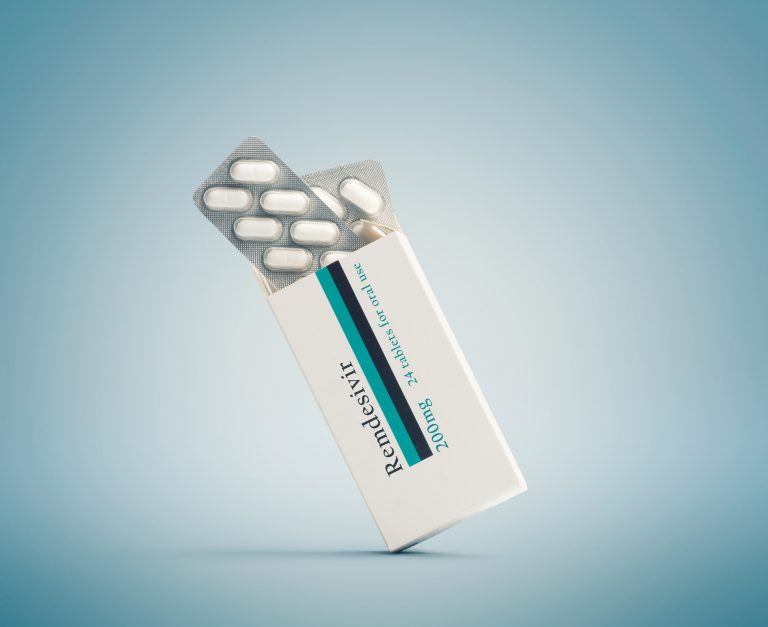
Researchers working with the World Health Organization (WHO) have posted interim results from the agency’s 11,266-patient Solidarity trial which included Gilead Sciences’ Veklury (remdesivir) among four antiviral treatments that they said failed to show effectiveness in hospital inpatients with COVID-19—the same day the agency added the antiviral drug to its “prequalified” list, supporting its use by the UN and other global entities.
“Remdesivir, hydroxychloroquine, lopinavir [co-administered with ritonavir] and interferon regimens appeared to have little or no effect on hospitalized COVID-19,” the researchers concluded in a preprint posted in medRxiv on Thursday. “The unpromising overall findings from the regimens tested suffice to refute early hopes, based on smaller or non-randomized studies, that any will substantially reduce inpatient mortality, initiation of ventilation or hospitalization duration.”
Remdesivir is a broad-spectrum antiviral adenosine nucleotide prodrug initially developed to treat Ebola. Remdesivir made global headlines earlier this month when President Donald Trump’s medical team added the drug to the interventions given to the president after he tested positive for COVID-19—interventions that began with Regeneron’s two-antibody combination or “cocktail,” REGN-COV2.
Remdesivir made history again on Thursday, when it became the 579th medicine or finished pharmaceutical product—and the first COVID-19 therapeutic—to receive prequalified status from the WHO. The WHO prequalifies drugs whose manufacturers have shown the agency that they have the capacity to produce a product of consistent quality in accordance with international standards and WHO/UNFPA-United Nations Population Fund specifications.
Remdesivir is one of 19 “front runners” among more than 300 COVID-19 drug and vaccine candidates on GEN’s COVID-19 Drug & Vaccine Tracker.
30-Country trial
The WHO’s Solidarity trial is a 405-hospital, 30-country open-label randomized trial among 11,266 hospital inpatients—of which 2,750 adults were randomized to a 10-day course of remdesivir, consisting of 200mg the first day, followed by doses of 100 mg the other nine days. The trial is designed to assess the effect of remdesivir and the other three treatment options on in-hospital mortality.
Mortality was measured via death rate ratio and drug vs control numbers of deaths reported to date. Remdesivir showed a death rate ratio of 0.95 (301/2743 vs 303/2708). hydroxychloroquine, 1.19 (0.89-1.59, p=0.23; 104/947 vs 84/906), lopinavir/ritonvir, 1.00 (0.79-1.25, p=0.97; 148/1399 vs 146/1372) and interferon, 1.16 (0.96-1.39, p=0.11; 243/2050 vs 216/2050).
“No study drug had any definite effect on mortality, either overall (each p>0.10) or in any subgroup defined by age or ventilation at entry (or other entry characteristics, or geographic region, or corticosteroid use),” the researchers reported.
The WHO previously halted arms of the trial for hydroxychloroquine, and lopinavir/ritonavir (an HIV combination therapy marketed by AbbVie as Kaletra® and Aluvia®)—but did not stop the treatment arms for remdesivir or interferon beta-1a, a multiple sclerosis treatment marketed by Merck KGaA as Rebif®.
Among patients still hospitalized at day 7, the study drug-vs-control ratio for remdesivir was 69%v59%—compared with 64%v54% for hydroxychloroquine, and 68%v59% for lopinavir/ritonavir. And among patients where ventilation initiated after randomization, the study drug vs control ratio for remdesivir was 295v284—compared with 75v66 for hydroxychloroquine, 124v119 for lopinavir/ritonavir, and 209v210 for interferon.
Hydroxychloroquine is the long-marketed antimalarial drug Trump has promoted along with azithromycin against COVID-19. In May, Trump acknowledged taking hydroxychloroquine in combination with zinc against the virus. Zinc was also among the treatments Trump took in addition to remdesivir and REGN-COV2 for COVID-19 earlier this month, along with Vitamin D and famotidine—a Histamine-2 blocker (H2 blocker) sold over the counter as Pepcid®.
Firing back: Randomized results
Gilead fired back through a statement that contrasted the WHO’s finding with more positive results for remdesivir in the NIH-sponsored Adaptive COVID-19 Treatment Trial (ACTT-1; NCT04280705), a randomized, double-blind, placebo-controlled clinical trial whose results have already been peer-reviewed—unlike Solidarity, Gilead pointedly added.
“The emerging data appear inconsistent with more robust evidence from multiple randomized, controlled studies published in peer-reviewed journals validating the clinical benefit of Veklury® (remdesivir). We are concerned that the data from this open-label global trial have not undergone the rigorous review required to allow for constructive scientific discussion, particularly given the limitations of the trial design,” Gilead said of Solidarity.
The international team of researchers that carried out the 1,042-participant ACTT-1 trial published results from the trial October 8 in The New England Journal of Medicine. The ACTT-1 researchers reported that the 541 patients randomized to remdesivir showed a median recovery time of 10 days, compared with 15 days among the 521 placebo patients.
Using an eight-category ordinal scale, researchers found that the remdesivir patients were more likely than those receiving placebo to show clinical improvement at day 15. Remdesivir also showed a Kaplan–Meier mortality estimate of 6.7%, vs. 11.9% for placebo.
“Our data show that remdesivir was superior to placebo in shortening the time to recovery in adults who were hospitalized with COVID-19 and had evidence of lower respiratory tract infection,” the ACTT-1 researchers concluded.
Positives and negatives
The ACTT-1 study showed both positive and negatives for remdesivir, Geoffrey C. Porges, MBBS, director of therapeutics research and a senior research analyst at SVB Leerink, wrote in a research note.
“The good news is that the final results of the trial were very consistent with the previously released interim result (that formed the basis for the EUA) and suggests that remdesivir is indeed helpful in shortening the duration of disease, reducing the progression to more complicated disease, and probably (but not definitively), saving lives,” Porges wrote.
On the other hand, remdesivir did not decrease mortality at day 29, showing a mortality estimate of 11.4%, compared with 15.2% for placebo.
“The fine print of the results is perhaps less encouraging than the top line—while remdesivir seems to accelerate clearance of virus and resolution of symptoms, it did not improve survival at 29 days which is the endpoint of most importance in the end,” Porges added.













